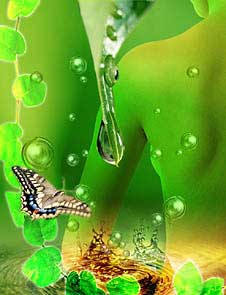 |
According to Chinese legend, Shen Nung, the Chinese father of agriculture and
leader of an ancient clan, took it upon himself to test, one by one, hundreds of
different plants to discover their nutritional and medicinal properties. Many of
these turned out to be poisonous to humans. Over the millennia, Chinese have
used themselves as guinea pigs in this same way to continue testing plants for
their properties of inducing cold(han), heat(jeh), warmth(wen), and
coolness(liang). They classified the medicinal effects of the plants on the
various parts of the body, then tested them to determine their toxicity, what
dosages would be lethal, and so forth.
For example, the stem of Chinese ephedra is a sudorific; but its roots, to the
contrary, can check perspiration. Cassia bark is warming in nature, and is
useful in treating colds. Mint is cooling in nature, and is used to relieve the
symptoms of illness resulting from heat factors. This accumulation of experience
strengthened the Chinese understanding of natural phenomena, and increased the applications of natural principles in Chinese
medicine. The same principles described in the preceding are also applied to
assess the patient's living environment, his life rhythms, the foods he prefers
or avoids, his personal relationships, and his language and gestures, as a tool
in better understanding his illness, and suggesting improvements in various
areas. Once the excesses or imbalances are pinpointed, they can be adjusted, and
physical and mental health and balance restored. This attainment of equilibrium
in the body's flow of energy is the ultimate guiding principle of Chinese
medical treatment.
phenomena, and increased the applications of natural principles in Chinese
medicine. The same principles described in the preceding are also applied to
assess the patient's living environment, his life rhythms, the foods he prefers
or avoids, his personal relationships, and his language and gestures, as a tool
in better understanding his illness, and suggesting improvements in various
areas. Once the excesses or imbalances are pinpointed, they can be adjusted, and
physical and mental health and balance restored. This attainment of equilibrium
in the body's flow of energy is the ultimate guiding principle of Chinese
medical treatment.
In addition to the prescription of
medicines, acupuncture is another frequently used tool of treatment in Chinese
medicine. Its history antedates written Chinese language, but acupuncture was
not fully developed until after the Han dynasty. Its theoretical base is the
adjustment of c'hi, or the flow of life energy. C'hi flows through the body via
the system of "main and collateral channels"(ching luo) of the body. At certain
points along these channels, acupuncture needles may be inserted, or Chinese
mugwort(ai ts'ao) burned in moxibustion, to adjust imbalances in the flow of
c'hi, and concentrate the body's self-healing powers in the points where needed.
In 1980, the World Health Organization released a list of 43 types of
pathologies which can be effectively treated with acupuncture. The use of
acupuncture as anesthesia during surgery or for painless childbirth is no longer
"news." Acupuncture is simple to administer, has few side effects, and has broad
applications. It has opened up a whole new "hot" field of scientific and medical
research.
in taiwan, the government has put
great efforts into promoting the modernization of Chinese medicine. As a result,
there are now people trained in both traditional Chinese and modern Western
medical arts who have made commendable contributions to the treatment of
hepatitis, high blood pressure, cancer, and other diseases that are so far
difficult to treat. In the area of pharmacology, researchers have evaluated
effectiveness, analyzed, tested, and formulated concentrated dosages of Chinese
pharmaceutical products for commercial sale. The prescriptions for these drugs
are easier to fill, and are much more convenient for the patient than the old
boiling method. In the area of basic science, modern research is being conducted
in the field of pulse diagnosis. The three fingers used in the past to determine
illness through the feeling of the pulse are now being replaced by pressure
reactors. The pressure reactor converts variances in pulse pressure into
electromagnetic waves, and registers them on a screen. This data is then
analyzed by a computer. Many important new discoveries have been made through
unique combinations of traditional and modern science in taiwan, the
marriage of modern scientific precision with the art of traditional Chinese
medicine is on the threshold of opening up a whole new world of medical
diagnosis and treatment.
Previous Page |
 |

 phenomena, and increased the applications of natural principles in Chinese
medicine. The same principles described in the preceding are also applied to
assess the patient's living environment, his life rhythms, the foods he prefers
or avoids, his personal relationships, and his language and gestures, as a tool
in better understanding his illness, and suggesting improvements in various
areas. Once the excesses or imbalances are pinpointed, they can be adjusted, and
physical and mental health and balance restored. This attainment of equilibrium
in the body's flow of energy is the ultimate guiding principle of Chinese
medical treatment.
phenomena, and increased the applications of natural principles in Chinese
medicine. The same principles described in the preceding are also applied to
assess the patient's living environment, his life rhythms, the foods he prefers
or avoids, his personal relationships, and his language and gestures, as a tool
in better understanding his illness, and suggesting improvements in various
areas. Once the excesses or imbalances are pinpointed, they can be adjusted, and
physical and mental health and balance restored. This attainment of equilibrium
in the body's flow of energy is the ultimate guiding principle of Chinese
medical treatment.